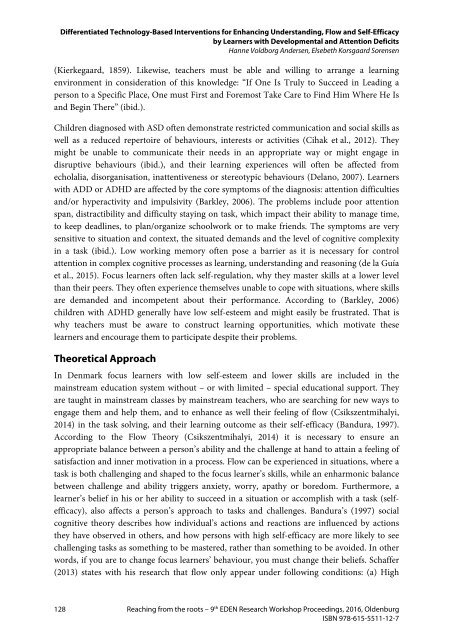Forging new pathways of research and innovation in open and distance learning
RW_2016_Oldenburg_Proceedings
RW_2016_Oldenburg_Proceedings
Create successful ePaper yourself
Turn your PDF publications into a flip-book with our unique Google optimized e-Paper software.
Differentiated Technology-Based Interventions for Enhanc<strong>in</strong>g Underst<strong>and</strong><strong>in</strong>g, Flow <strong>and</strong> Self-Efficacy<br />
by Learners with Developmental <strong>and</strong> Attention Deficits<br />
Hanne Voldborg Andersen, Elsebeth Korsgaard Sorensen<br />
(Kierkegaard, 1859). Likewise, teachers must be able <strong>and</strong> will<strong>in</strong>g to arrange a learn<strong>in</strong>g<br />
environment <strong>in</strong> consideration <strong>of</strong> this knowledge: “If One Is Truly to Succeed <strong>in</strong> Lead<strong>in</strong>g a<br />
person to a Specific Place, One must First <strong>and</strong> Foremost Take Care to F<strong>in</strong>d Him Where He Is<br />
<strong>and</strong> Beg<strong>in</strong> There” (ibid.).<br />
Children diagnosed with ASD <strong>of</strong>ten demonstrate restricted communication <strong>and</strong> social skills as<br />
well as a reduced repertoire <strong>of</strong> behaviours, <strong>in</strong>terests or activities (Cihak et al., 2012). They<br />
might be unable to communicate their needs <strong>in</strong> an appropriate way or might engage <strong>in</strong><br />
disruptive behaviours (ibid.), <strong>and</strong> their learn<strong>in</strong>g experiences will <strong>of</strong>ten be affected from<br />
echolalia, disorganisation, <strong>in</strong>attentiveness or stereotypic behaviours (Delano, 2007). Learners<br />
with ADD or ADHD are affected by the core symptoms <strong>of</strong> the diagnosis: attention difficulties<br />
<strong>and</strong>/or hyperactivity <strong>and</strong> impulsivity (Barkley, 2006). The problems <strong>in</strong>clude poor attention<br />
span, distractibility <strong>and</strong> difficulty stay<strong>in</strong>g on task, which impact their ability to manage time,<br />
to keep deadl<strong>in</strong>es, to plan/organize schoolwork or to make friends. The symptoms are very<br />
sensitive to situation <strong>and</strong> context, the situated dem<strong>and</strong>s <strong>and</strong> the level <strong>of</strong> cognitive complexity<br />
<strong>in</strong> a task (ibid.). Low work<strong>in</strong>g memory <strong>of</strong>ten pose a barrier as it is necessary for control<br />
attention <strong>in</strong> complex cognitive processes as learn<strong>in</strong>g, underst<strong>and</strong><strong>in</strong>g <strong>and</strong> reason<strong>in</strong>g (de la Guía<br />
et al., 2015). Focus learners <strong>of</strong>ten lack self-regulation, why they master skills at a lower level<br />
than their peers. They <strong>of</strong>ten experience themselves unable to cope with situations, where skills<br />
are dem<strong>and</strong>ed <strong>and</strong> <strong>in</strong>competent about their performance. Accord<strong>in</strong>g to (Barkley, 2006)<br />
children with ADHD generally have low self-esteem <strong>and</strong> might easily be frustrated. That is<br />
why teachers must be aware to construct learn<strong>in</strong>g opportunities, which motivate these<br />
learners <strong>and</strong> encourage them to participate despite their problems.<br />
Theoretical Approach<br />
In Denmark focus learners with low self-esteem <strong>and</strong> lower skills are <strong>in</strong>cluded <strong>in</strong> the<br />
ma<strong>in</strong>stream education system without – or with limited – special educational support. They<br />
are taught <strong>in</strong> ma<strong>in</strong>stream classes by ma<strong>in</strong>stream teachers, who are search<strong>in</strong>g for <strong>new</strong> ways to<br />
engage them <strong>and</strong> help them, <strong>and</strong> to enhance as well their feel<strong>in</strong>g <strong>of</strong> flow (Csikszentmihalyi,<br />
2014) <strong>in</strong> the task solv<strong>in</strong>g, <strong>and</strong> their learn<strong>in</strong>g outcome as their self-efficacy (B<strong>and</strong>ura, 1997).<br />
Accord<strong>in</strong>g to the Flow Theory (Csikszentmihalyi, 2014) it is necessary to ensure an<br />
appropriate balance between a person’s ability <strong>and</strong> the challenge at h<strong>and</strong> to atta<strong>in</strong> a feel<strong>in</strong>g <strong>of</strong><br />
satisfaction <strong>and</strong> <strong>in</strong>ner motivation <strong>in</strong> a process. Flow can be experienced <strong>in</strong> situations, where a<br />
task is both challeng<strong>in</strong>g <strong>and</strong> shaped to the focus learner’s skills, while an enharmonic balance<br />
between challenge <strong>and</strong> ability triggers anxiety, worry, apathy or boredom. Furthermore, a<br />
learner’s belief <strong>in</strong> his or her ability to succeed <strong>in</strong> a situation or accomplish with a task (selfefficacy),<br />
also affects a person’s approach to tasks <strong>and</strong> challenges. B<strong>and</strong>ura’s (1997) social<br />
cognitive theory describes how <strong>in</strong>dividual’s actions <strong>and</strong> reactions are <strong>in</strong>fluenced by actions<br />
they have observed <strong>in</strong> others, <strong>and</strong> how persons with high self-efficacy are more likely to see<br />
challeng<strong>in</strong>g tasks as someth<strong>in</strong>g to be mastered, rather than someth<strong>in</strong>g to be avoided. In other<br />
words, if you are to change focus learners’ behaviour, you must change their beliefs. Schaffer<br />
(2013) states with his <strong>research</strong> that flow only appear under follow<strong>in</strong>g conditions: (a) High<br />
128 Reach<strong>in</strong>g from the roots – 9 th EDEN Research Workshop Proceed<strong>in</strong>gs, 2016, Oldenburg<br />
ISBN 978-615-5511-12-7


